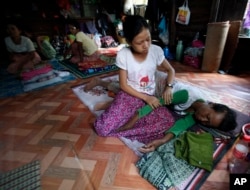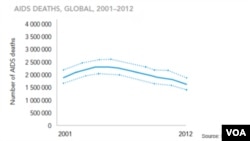SYDNEY —
Nobel Peace Prize winner Aung San Suu Kyi has highlighted progress in the battle against HIV in a World AIDS Day event in Australia. The Burmese democracy leader is a U.N. Aids Goodwill Ambassador. Australian campaigners say Aung San Suu Kyi’s visit is helping to boost international efforts to eradicate HIV.
About 34 million people around the world are HIV positive, but global rates of infection are gradually falling. New cases among adults and children were estimated at 2.3 million in 2012, which is a reduction of a third in a decade.
Aung San Suu Kyi is part of international efforts to combat the stigma and discrimination that often surrounds the disease. Her appearance in Melbourne has officially started the countdown to the 20th International AIDS Conference that the southern Australian city will host next July.
In Aung San Suu Kyi's home country, Burma, 200,000 people live with HIV and AIDS. Most are drug users, sex workers or gay men who live on the fringes of society without adequate treatment.
But in Australia, doctors said the number of new cases was at a 20-year high. Young gay men are most at risk; a group that seems to be ignoring decades of public health advice. Researchers say it is a trend that is being seen in many parts of the world.
Every day, about three Australians contract HIV, mostly through unsafe sex.
Professor Sharon Lewin is the director of the Department of Infectious Diseases at The Alfred Hospital in Melbourne.
“We currently know that there are 25,000 people living with HIV in Australia. Last year there were 1,200 new infections and in fact it's the highest number of new infections that we've seen for 20 years in Australia. And the causes we're still determining but it is most likely related to increasing high-risk behavior; probably some complacency about the seriousness of the diagnosis,” said Lewin.
Without treatment, doctors said HIV was “a universal death sentence,” but modern therapies were effective and easy to administer. They often involve just one tablet a day that contains three anti-HIV medicines.
Access to clean needles in Australia has sharply reduced the spread of the disease among people who inject drugs. The policy was introduced in the early 1980s. Australia’s success is in sharp contrast to Thailand, where up to 50 percent of intravenous drugs users are HIV positive.
World AIDS Day is observed on December 1 in more than 120 countries.
About 34 million people around the world are HIV positive, but global rates of infection are gradually falling. New cases among adults and children were estimated at 2.3 million in 2012, which is a reduction of a third in a decade.
Aung San Suu Kyi is part of international efforts to combat the stigma and discrimination that often surrounds the disease. Her appearance in Melbourne has officially started the countdown to the 20th International AIDS Conference that the southern Australian city will host next July.
In Aung San Suu Kyi's home country, Burma, 200,000 people live with HIV and AIDS. Most are drug users, sex workers or gay men who live on the fringes of society without adequate treatment.
But in Australia, doctors said the number of new cases was at a 20-year high. Young gay men are most at risk; a group that seems to be ignoring decades of public health advice. Researchers say it is a trend that is being seen in many parts of the world.
Every day, about three Australians contract HIV, mostly through unsafe sex.
Professor Sharon Lewin is the director of the Department of Infectious Diseases at The Alfred Hospital in Melbourne.
“We currently know that there are 25,000 people living with HIV in Australia. Last year there were 1,200 new infections and in fact it's the highest number of new infections that we've seen for 20 years in Australia. And the causes we're still determining but it is most likely related to increasing high-risk behavior; probably some complacency about the seriousness of the diagnosis,” said Lewin.
Without treatment, doctors said HIV was “a universal death sentence,” but modern therapies were effective and easy to administer. They often involve just one tablet a day that contains three anti-HIV medicines.
Access to clean needles in Australia has sharply reduced the spread of the disease among people who inject drugs. The policy was introduced in the early 1980s. Australia’s success is in sharp contrast to Thailand, where up to 50 percent of intravenous drugs users are HIV positive.
World AIDS Day is observed on December 1 in more than 120 countries.










